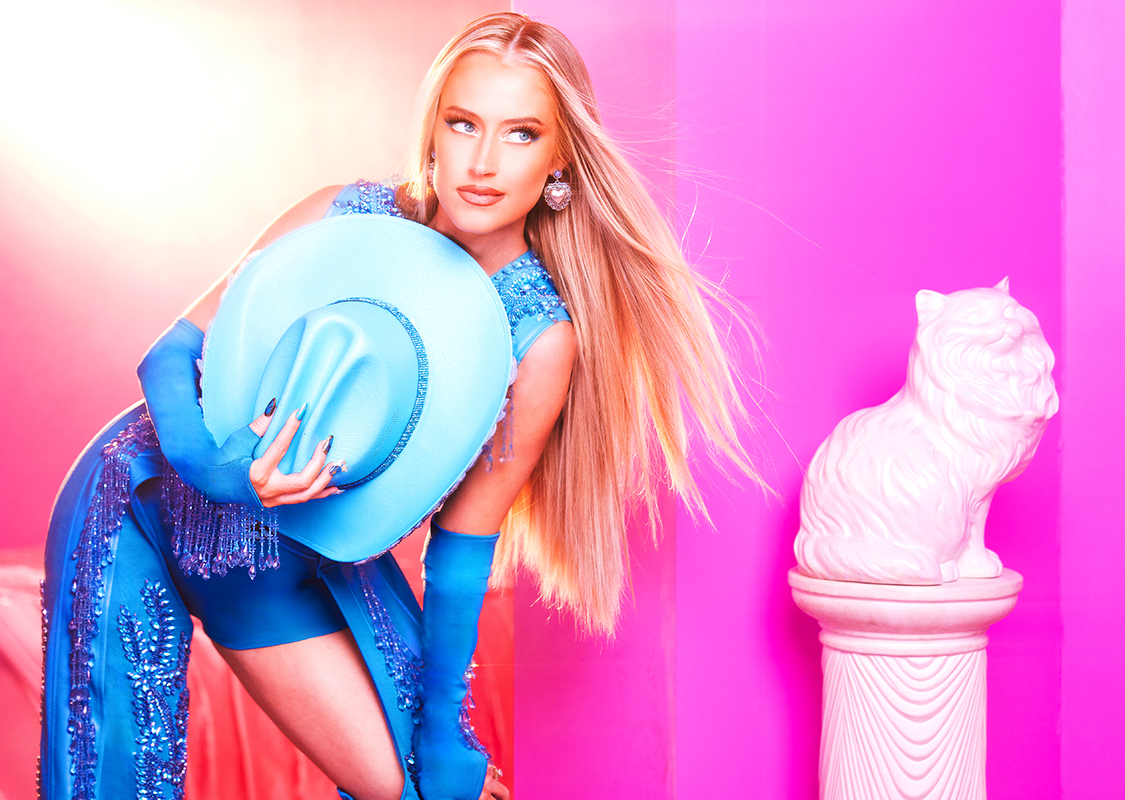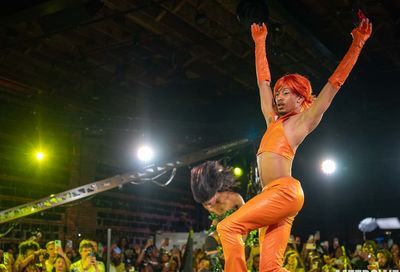25 Gay Films Everyone Should See
Must-see gay movies from 'Aimee & Jaguar' to 'Wedding Banquet'
LA CAGE AUX FOLLES (1978)
This uproarious French farce, set amid the nightlife of St. Tropez, spawned two fairly decent sequels, a catchy, elaborate Broadway musical, and a bland, watered-down American imitation. But it is the original — with precise comedic performances by Ugo Tognazzi as the owner of a drag nightclub and the scene-stealing Michel Serrault as his prone-to-hysterics partner Albin — that demands our full admiration, not to mention constant giddy fits of laughter. As the two middle-aged gay men struggle to appease their exasperated son (yes, this was a movie way ahead of its time), who has brought his fiancé’s conservative family home for dinner, La Cage reaches unsurpassed comic heights. It’s not just a funny gay film — it’s one of the funniest films in the history of all cinema.
LONGTIME COMPANION (1990)

Longtime Companion
An imperfect yet earnest film can capture a permanent place in our collective hearts, which explains the lasting impression of Longtime Companion. Both lauded and lambasted at its 1990 release as an attempt to humanize the face of gay men with AIDS for a nervous nation, the film, written by playwright Craig Lucas (Prelude to a Kiss), focuses on the lives of mostly white Manhattanites as they journey through the unfolding horrors of the epidemic. Despite its flaws, Longtime Companion delivers a powerful emotional experience, including the scene that earned Bruce Davison an Academy Award nomination, an unabashedly tearful moment of telling a loved one that it’s okay to let go — all the while knowing that much of the world at large is indifferent to, or even glad of, his suffering. It’s a telling reminder of where we’ve been.
MA VIE EN ROSE (1997)
The constant crush of convention becomes obvious when watching good people betray that goodness for fear of crossing social boundaries. With Ma Vie en Rose, the point is made as we watch a young girl, née Ludovic after being born into the body of a boy, struggle to own her identity, as her otherwise loving parents continually fend off embarrassment by pushing her back into her prescribed box. Director-writer Alain Berliner’s touches of fantasy help to illustrate the degree to which constraint kills personal liberty, how the sad circumstance of being born in a body that doesn’t match one’s gender identity is needlessly worsened by social demands that extinguish self-expression. It’s the rare combination of sugary tableaux concealing a remarkable nutritional value.
MAURICE (1987)
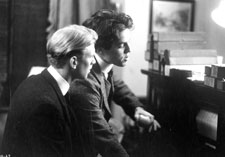
Maurice
Sometimes the present can be clearer by looking at the past. Maybe that explains the power of the British costume drama Maurice, a tale of upper-class homosexual tendencies crossed with lower-class sexual desire. In this Merchant-Ivory adaptation of E.M. Forster’s slim novel, two English schoolboys have a special relationship while at Cambridge — but once out of school, Maurice (James Wilby) feels drawn to continue it, while Clive (a young Hugh Grant) wants to put it behind him in order to fulfill the hetero expectations of his society. Forster wanted a happy ending for his novel because such things at the time were impossible. In 1987, happy endings often seemed just as far away as ever, so Maurice’s final discovery of love and joy rang as true (if historically iffy) as ever.
MILK (2008)
THE TIMES OF HARVEY MILK (1984)
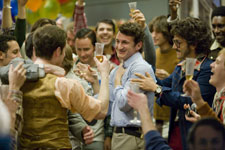
The high-profile Oscar candidate Milk hasn’t generated the same comedic outpouring as did Brokeback Mountain — it does, after all, end with a recreation of a brutal assassination. But, despite the true tragedy of the ending, it’s the vibrant and buoyant joy for life contained in Harvey Milk that makes this biopic so compelling. That, and the fact that Sean Penn gives a performance that’s simply stunning in its accuracy and humanity. Penn may be a bit of a whack-job in real life, but for Milk he left an indelible mark on the screen. Still, for those whose curiosity about Milk and his early-gay-rights milieu has been piqued, the definitive story of his life remains the Oscar-winning documentary The Times of Harvey Milk. Taken together, they’re a fitting tribute to a man whose legacy has had achieved the far-reaching change you know he hoped for.
MY BEAUTIFUL LAUNDRETTE (1985)
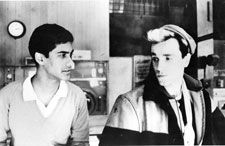
My Beautiful Laundrette
Long before he was the toast of cinematic circles, Daniel Day-Lewis played Johnny, a working-class London thug who would join in Thatcher-era race rallies. But he’s redeemed through hard work for his Pakistani boss, Omar, who is also his lover. In the mid 1980s, My Beautiful Laundrette was groundbreaking for not making gay the point of conflict. While all the friction hinges on race and class, the love between two young men is offered as the one thing that’s simple and good amid all the mess. The movie shouts, gaily, that all the world should be lovers rather than fighters. Johnny’s ”Come On Eileen” styled wardrobe also deserves special mention.
MYSTERIOUS SKIN (2004)
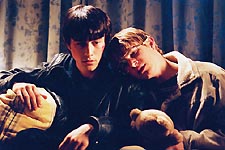
An unfortunate reality of film is that one film’s success sometimes comes at the expense of another’s. All the (well-deserved) passion for Brokeback Mountain had the unfortunate side-effect of muting attention for Mysterious Skin — a film that couldn’t have been more different in its approach, but was every bit its equal in terms of emotional power and quality. Gregg Araki, long known for his subversive queer sensibility in The Living End and The Doom Generation, turned in a work that cements his reputation as a director with both attitude and talent to spare. At the center of Mysterious Skin‘s story of the psychological aftermath of sexual abuse on vulnerable gay youth is a fascinating and fearless performance by Joseph Gordon-Levitt — not fearless for playing gay, but fearless for playing so emotionally naked. By turns funny, sexy and deeply disturbing, Mysterious Skin deserves to live on as an example of how powerful gay cinema can be.
Read more:
25 Gay Films Everyone Should See: The Sequel
25 Gay Films Everyone Should See: Part 3D
13 Camp Films Everyone Should See
20 Gay Shorts Everyone Should See
15 Black LGBTQ Films Everyone Should See
PARAGRAPH 175 (2000)
In no way entertaining, but powerfully educational, directors Rob Epstein and Jeffrey Friedman follow historian Klaus Müller as he attempts to locate the handful of gay men who survived persecution under Paragraph 175, the legal tool employed during the Third Reich to eradicate gays. Including a lesbian who escaped to England, these interviews reveal a range of experiences and resolutions, with some interviewees holding steadfast to anger, some to misery, some even to humor — all to their humanity. For the chapter your high-school history class forgot, Paragraph 175 is a must. Strong use of archival footage and photos helps to make real a history that is almost impossible to believe.
PARIS IS BURNING (1990)
”You can be and do anything,” says one of the competitors when asked about the lure of the ”drag balls.” With Paris Is Burning, documentary director Jennie Livingston captures that sense of liberation, scratched from lives lived on the street in many cases. With the creativity that marks gay culture, the stars of this film are those at-risk youths — and some older veterans — who annexed a corner of harsh reality and collectively transformed it into something so fabulous that even Madonna had to copy it. Paris Is Burning is a documentary mélange of Rent meets Les Misérables meets Dynasty. And it’s beautiful.
PARTING GLANCES (1986)
If life were fair, Bill Sherwood would have lived to create an entire body of gay and lesbian cinema. Life, of course, is not fair, and we’re left with just one shining moment of Sherwood’s vision, 1986’s Parting Glances, a serio-comic tale of New York gay life in the age of AIDS. Anchored by a kinetic and moving performance by then-unknown Steve Buscemi, the film captures a community at a crux — leaving behind the sexual carnival of the 1970s, yet unsure how to survive into the 1990s. That Sherwood died shortly after the film was completed was not only a loss for movies, but for the community as a whole.
Support Metro Weekly’s Journalism
These are challenging times for news organizations. And yet it’s crucial we stay active and provide vital resources and information to both our local readers and the world. So won’t you please take a moment and consider supporting Metro Weekly with a membership? For as little as $5 a month, you can help ensure Metro Weekly magazine and MetroWeekly.com remain free, viable resources as we provide the best, most diverse, culturally-resonant LGBTQ coverage in both the D.C. region and around the world. Memberships come with exclusive perks and discounts, your own personal digital delivery of each week’s magazine (and an archive), access to our Member's Lounge when it launches this fall, and exclusive members-only items like Metro Weekly Membership Mugs and Tote Bags! Check out all our membership levels here and please join us today!








